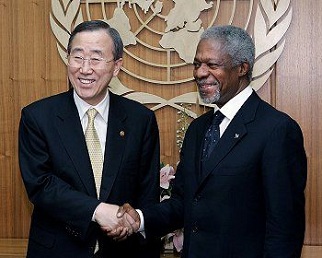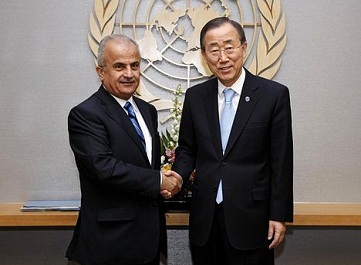Ban Ki-moon: A Record of Failure and Betrayal

Photo: Ban Ki-moon (L), Foreign Minister of South Korea, shakes hands with United Nations Secretary-General Kofi Annan (R) after a meeting in the General Assembly at U.N. headquarters in New York. (October 5, 2006)
The UN Charter's Preamble states:
"WE THE PEOPLES OF THE UNITED NATIONS DETERMINED
● to save succeeding generations from the scourge of war, which twice in our lifetime has brought untold sorrow to mankind, and
● to reaffirm faith in fundamental human rights, in the dignity and worth of the human person, in the equal rights of men and women and of nations large and small, and
● to establish conditions under which justice and respect for the obligations arising from treaties and other sources of international law can be maintained, and
● to promote social progress and better standards of life in larger freedom...."
The body affirms international support for tolerance, peace and security, and resolve to promote universal economic and social advancement.
However, since its 1945 founding, it's failed on all counts, even though some of its agencies (like UNICEF, WFP, UNHCR and UNESCO) at times provide aid in areas of health, education, food assistance, refugees, social development and more.
It's never enough though, timely, or with resolve to support troubled people adequately in times of need.
Moreover, global wars raged every year post-WW II to the present. The UN's been unable or disinterested in stopping them. One of its fatal flaws is structure, hamstrung by its dominant member, America. It can and does veto measures other member states support, notably when contrary to its imperial interests.




























